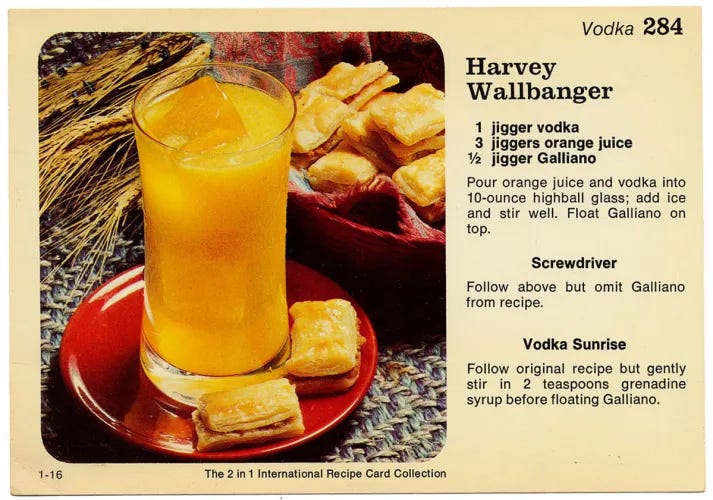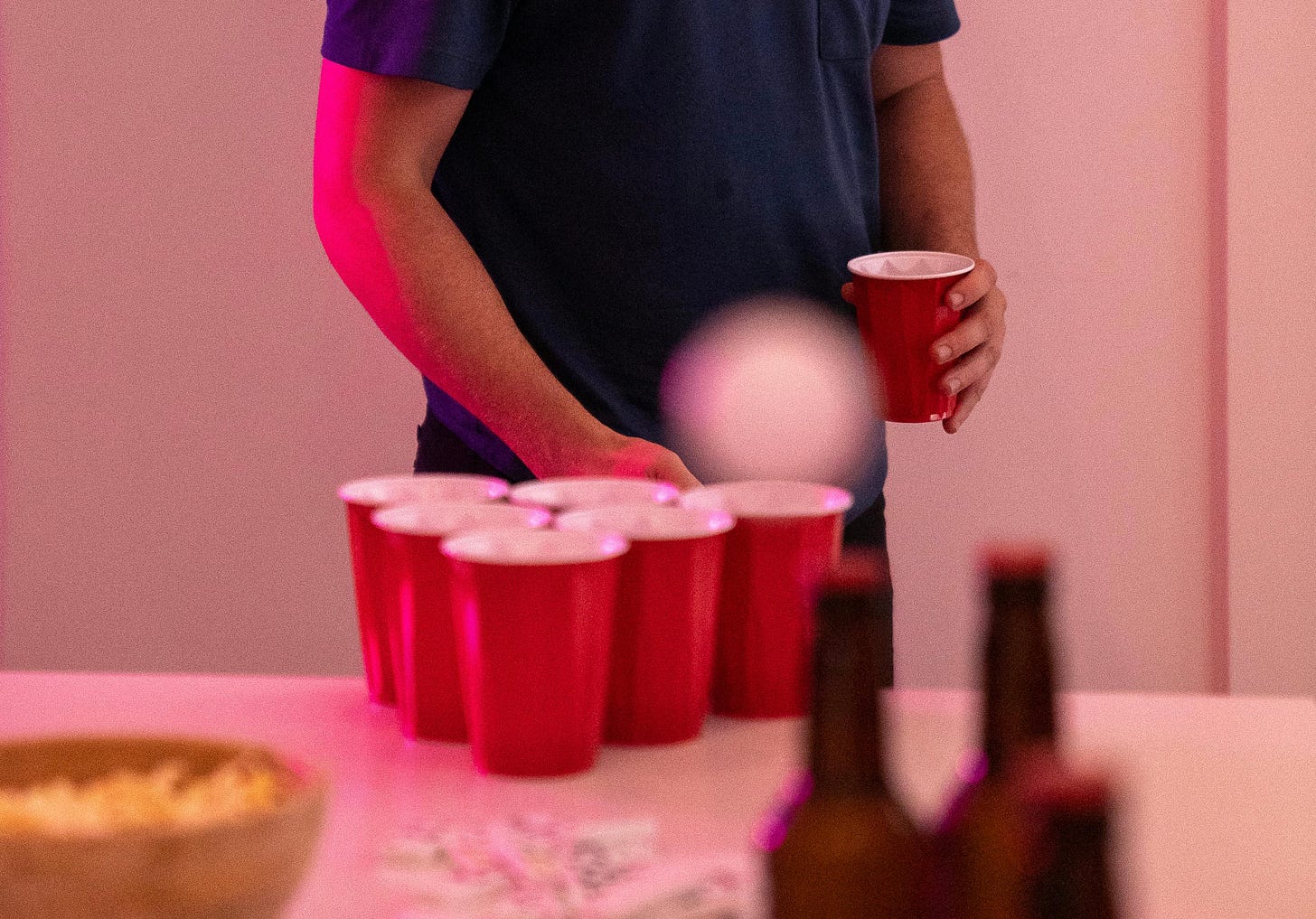The Blues & Billie Armstrong 35
HOW'S YOUR DRINK?
Previously in The Blues & Billie Armstrong…
“Hank? Oh, he’s harmless,” Billie said. “Just blowing off steam, probably trying not to think about where he’s headed in a couple weeks. I bet he’s more afraid than he lets on.”
Sonny said, “You never know how fear shows up.”
Space 19 was Trey’s place, isolated at the end of a dirt driveway that branched off the main loop of the park.
A seedy old singlewide that was once the caretaker’s residence and now sat rusting next to Bottlerock Creek, surrounded by unruly weeds, crumbling tires and parts cars. I suppose the rent was cheap.
It was just me and Billie walking out the driveway and up to the front yard. Alice said she had to go home but might sneak out later. And Nate didn’t want anything to do with Trey Morgan, who he said bullied him all through school. But Billie wanted Harvey Wallbangers—they were supposed to be the latest thing and all the rage. And I’d never been to one of these local house parties. The parents wouldn’t be home for hours; I thought, what the heck.
It wasn’t much, really. Outside, three tourist dudes chugging beer and drooling over Hank’s Mustang. In the front room, the chunky driving rhythm of some hard rock turned up loud and distorted on a cheap little component stereo set. A local jock making out with a tourist chick on a saggy brown couch with milk crate side tables. Joey Quarterman wide-eyed and splayed out on a bean-bag chair with a ripped seam, tiny white pellets spilling onto the dirty shag carpet. Timmy, already clumsy drunk, barreling across the room and banging me in the chest with a pint bottle of tequila.
I took a taste. “Jesus, that’s terrible!” I took another.
“Shit makes you crazy,” he said, and grinned like that was a bonus. Then, pointing at Billie, “Hey, the sister… I’m supposed to tell you… Hank is in the kitchen.”
Then Hank hollered out, “Hey Red! Come meet Harvey Wallbanger.” And Billie drifted off to join a gathering of seven or eight people in the kitchen, which was really just across the room on the other side of a counter.
I checked out the music. A fiery red album cover that said Grand Funk. The current track, High Falootin’ Woman. The rest of Trey’s record collection was in the same vein: Led Zeppelin, Deep Purple, Steppenwolf. Some new band I’d never heard of called Black Sabbath.
Billie came back and handed me a can of Colt 45. “You should probably stick to beer.”
I popped the top and tipped the can to my mouth. It was worse than the tequila. “What about that?” Eyeing the plastic cup in her hand. “Is that the Wallbanger thing?”
“Yeah. Pretty strong,” she said. “But here, taste.”
Sweet and smooth. Like an orange creamsicle laced with vodka. I took a triple gulp.
“Hey, don’t drink the whole thing,” she said.
“Whoa there, Bullseye.” Hank suddenly appeared, snatched the cup out of my hand as I slurped another big pull. He handed it back to Billie. “I made this one special for you,” he said. “It’s got a little extra kick. Too strong for him.” He looked in the cup. “Way too strong,” he said. “I’ll make another one for you, kid. More your speed.” He headed back to the kitchen bar with Billie’s cup. I gave the beer to Joey, marooned on his bean-bag island.
Trey showed up shortly with two cups and firm instructions from Hank. He carefully distributed the drinks with showy emphasis. “This one’s for you, and this one’s for you.” Like I was ten years old or something.
“What’s with the old flag?” Billie said.
Over by the front door, a slim jut of wall, maybe four feet wide, stuck out into the room, creating the trailer park version of a foyer. I think it existed expressly for the purpose of blocking the view to the kitchen as you entered the lovely home, so your first impression would be of the stylish wood-paneled living room. Here was this lonely expanse of white sticking out like a Stanley Kubrick monolith, and it was decorated with a man-size flag of the United States, hung vertically and nearly reaching the crusty orange shag.
This kind of non-traditional flag display was already a LIFE Magazine hippie-crash-pad cliché in those days, so it struck me as unexpected here amongst the taped up Penthouse centerfolds and the ashtrays made of large bore pistons. Plus, it was a forty-eight-star flag, out of date now for more than a decade.
“It’s a family heirloom,” Trey said. “Pretty fucking cool, huh.” And we stood contemplating the flag while Trey bragged about his and Hank’s grandfather, Cecil Morgan Sr., how he fought the Nazis during World War II, came home with one of those million dollar wounds and a footlocker full of uniforms and medals, pictures of his buddies, some of those naked lady playing cards, plus a real Nazi sword. And this big American flag.
After the old man died, Trey ended up with the footlocker, traded the sword for a four-barrel Holley carburetor but kept the playing cards and the flag, which had been tacked to the wall with a couple roofing nails in honor of Hank’s impending service to the good ole U.S. of A.
“But I don’t expect you to understand patriotism,” Trey said, staring Billie down. “You think your buddy Nate’s some kind of a hero, making a big show when there’s no way he’ll even get called up his number’s so high. I’d say he’s a coward is what I’d say.”
“Man, they sell you boys that hero vs. coward crap and you eat it up, you can’t get enough,” said Billie. “Pure unadulterated bullshit and you just line up to pay for it with your lives.”
Trey looked about to fire off another salvo in this verbal skirmish, but Hank showed up all calm and friendly drunk, with a hand on Trey’s shoulder just in time. “That’s okay, Trey. Free country, different strokes and all that. How’s your drink, Billie?”
“Yeah, yeah, drink up,” said Trey, walking away.
“What about you, Trey? You signed up yet?” Billie called after him.
“Flat feet,” Hank butted in loudly.
“They wouldn’t take him,” he said, but then he shot us a not-really wink-wink and used his finger to make little circles by his temple.
The Blues & Billie Armstrong is a work of fiction. Names, characters, businesses, places, events and incidents in this book are either the product of the author's imagination or used in a fictitious manner. Any resemblance of the fictional characters to actual persons, living or dead, is purely coincidental.
© All Rights Reserved



